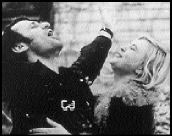WHEN HOLLYWOOD conceives the end of the world, it is imperative that it never ultimately happen. In Deep Impact and Armageddon, the Pentagon sends some ragtag crew into space to stop all the nonsense. What greater loss, after all, than the wondrous world we live in? And, moreover, what about those egomaniacs who presume to save us from asteroid-caused oblivion with their nuclear weapons?
LAST NIGHT
written and directed by Don McKellar
with Don McKellar and Sandra Oh
opens November 19 at Broadway Market
Just over the 49th parallel, however, Thirty-Two Short Films About Glenn Gould co-writer Don McKellar envisions a particularly, well, Canadian, demise. In his first feature, the world will end at midnight—period—and we know right away we’re in Canada because, as the film opens, everyone has already come to accept this. The real challenge is to figure out how to spend the remaining time—so that it’s either a helluva send-off or the ultimate opportunity for personal reflection. Barring these, it’s at least a chance to achieve the best orgasm of all time.
McKellar sets this seemingly grim scene with the dark humor you’d expect from the portrayer of memorable weirdos and whiners in Highway 61 and Exotica. An executive (director David Cronenberg) courteously calls to reassure his customers: “We will do our utmost to keep your gas going until the very end.” A jocular DJ counts down “the greatest hits of all time.” We realize later that these unfamiliar ’70s tunes are meaningless to everyone but him.
WITH A SENSITIVE EYE and a knack for the offbeat, McKellar pinpoints the poignancy of these individual quests in the face of accumulating chaos. He also plays a young widower who leaves his parents’ fake Christmas dinner to spend his last night alone with a bottle of wine and the stereo blasting. Instead, he crosses paths with a woman (Sandra Oh) desperately trying to reach her husband. He attempts to help her, ruining his solace but connecting with someone new. All around them the sense of collective doom mounts: Gangs of marauders loot stores and tip streetcars; inexplicably, the sun doesn’t set; and a lone runner shrieks out the remaining time on a solitary marathon through the abandoned business district.
Despite this impending finality, McKellar manages to imbue his characters with optimism. By the film’s—and the world’s—end, they have reached a pure, uncomplicated state of being. What lies in store—or in this case what doesn’t—becomes secondary to their having had the opportunity to choose their own goodbyes.








